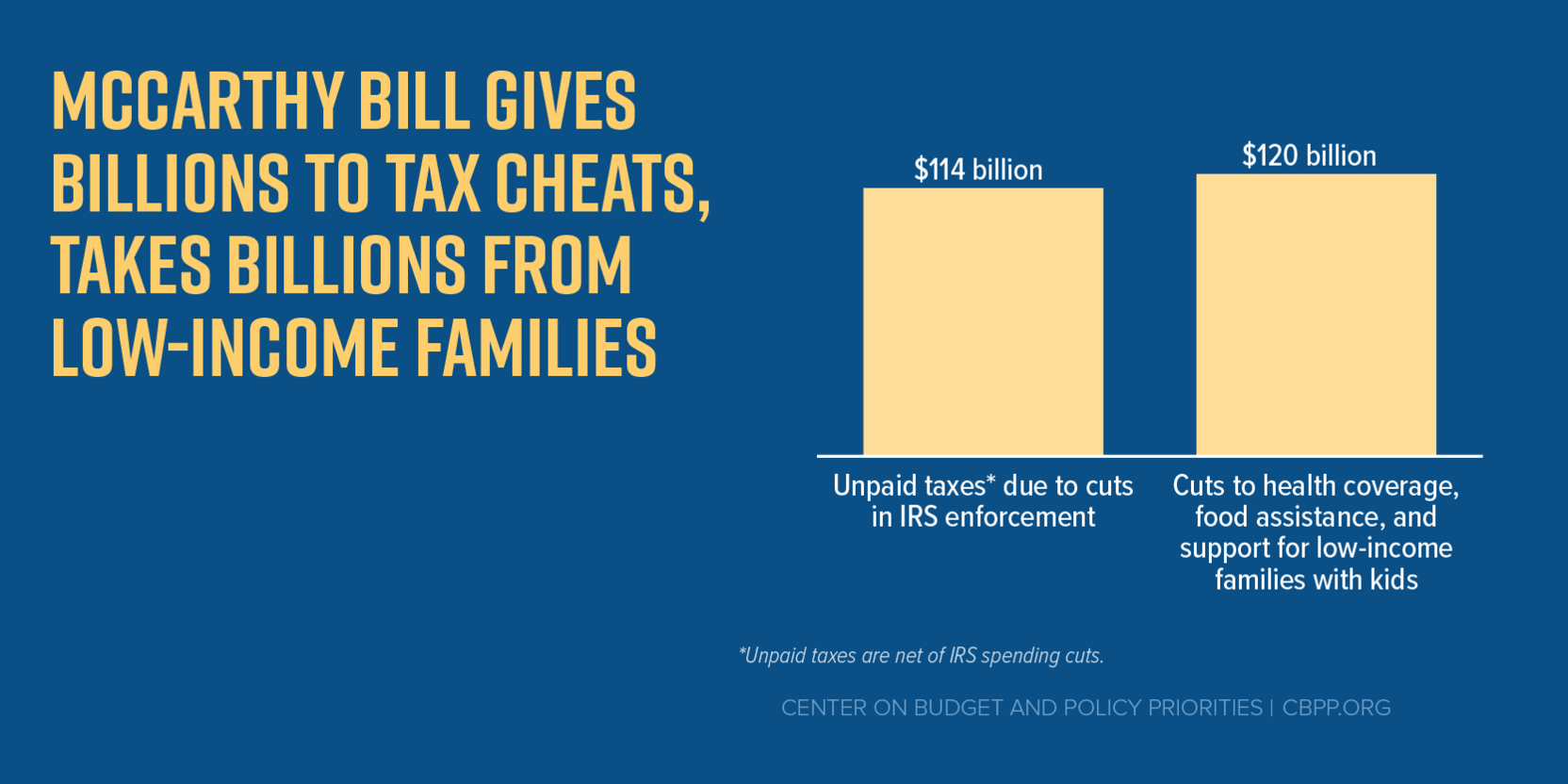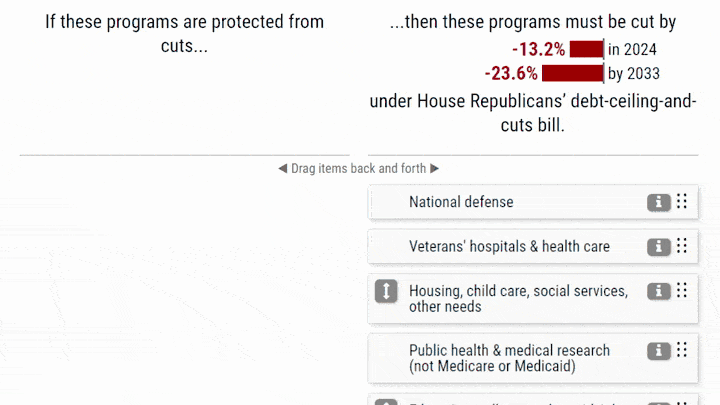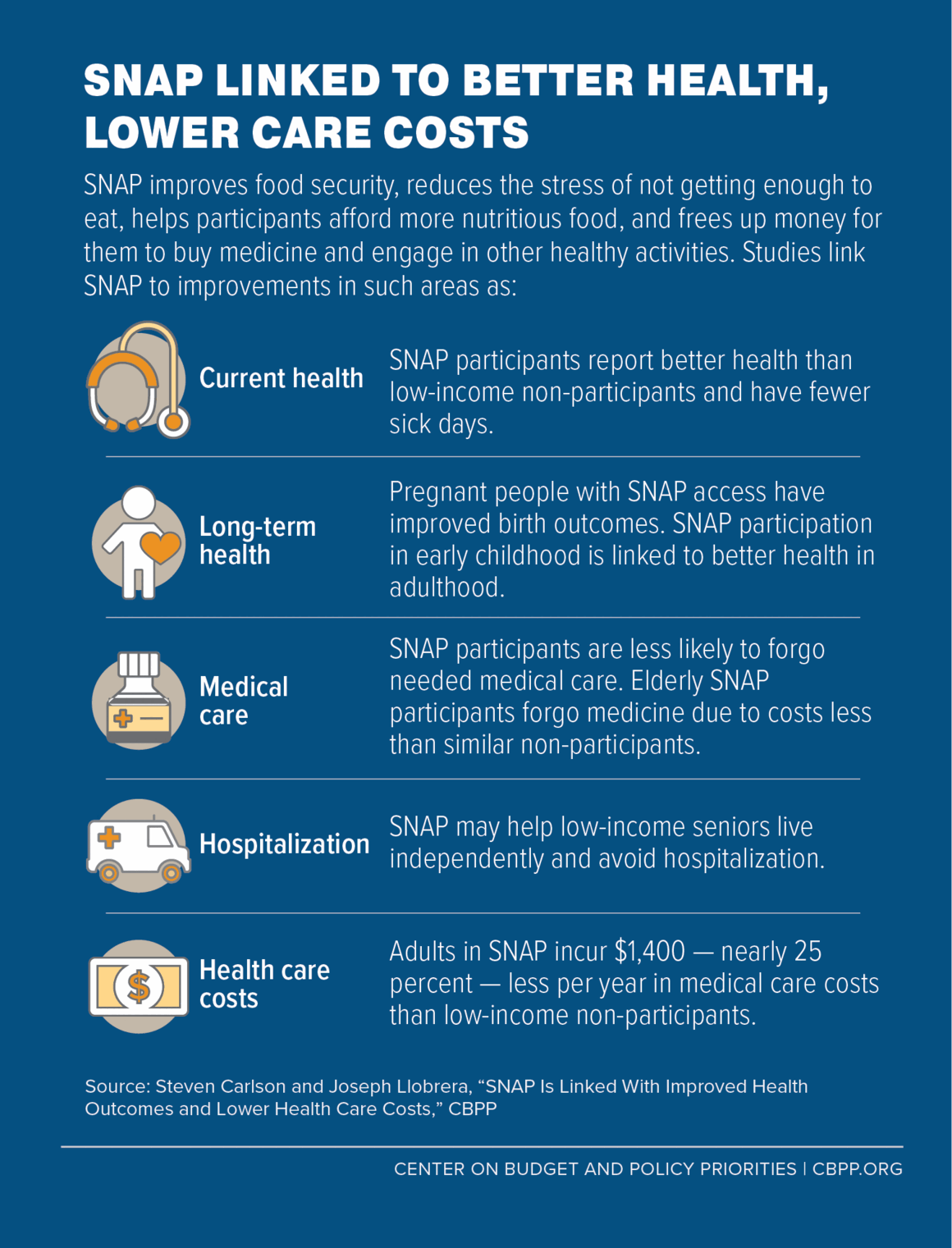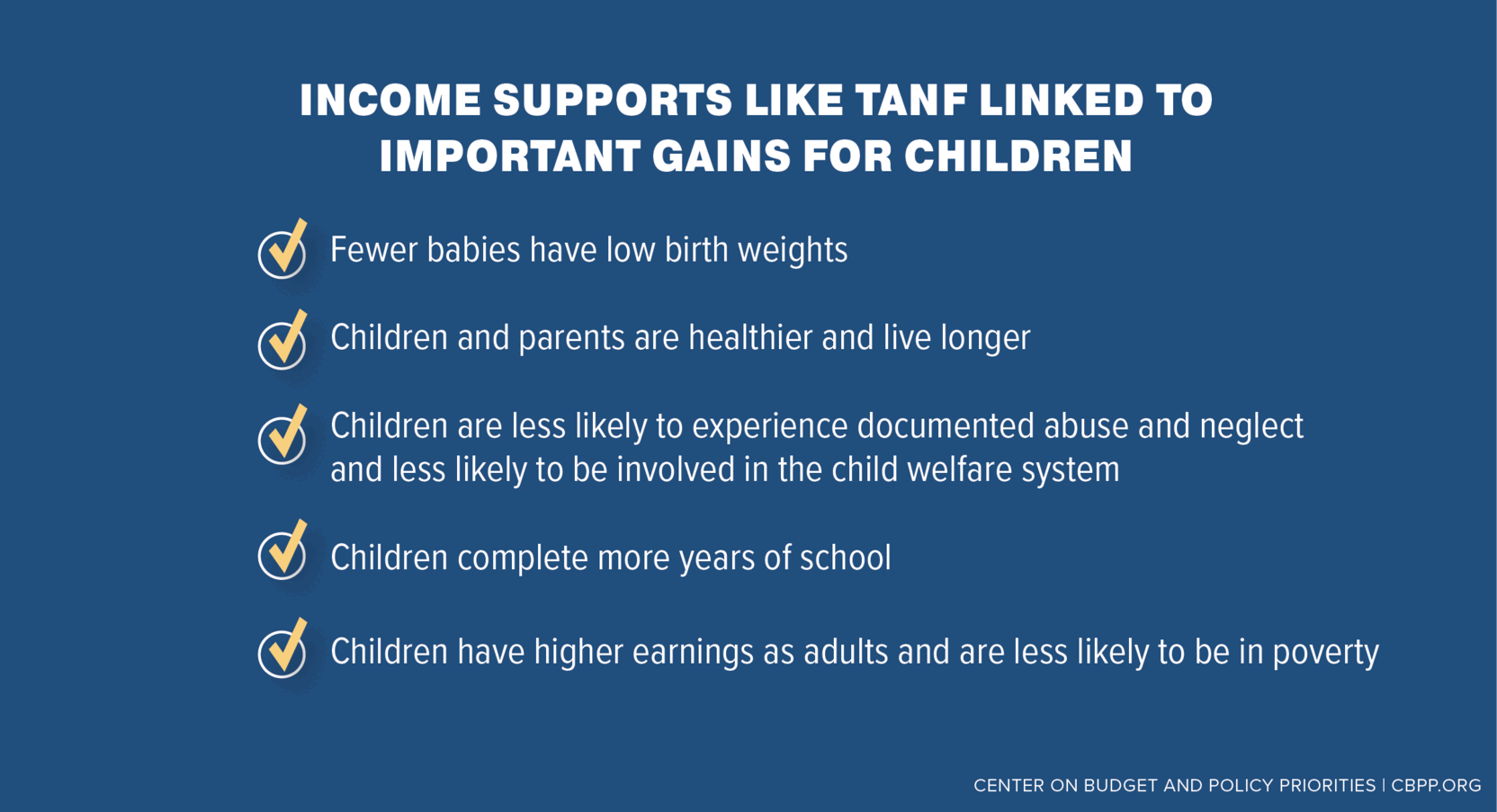BEYOND THE NUMBERS
Roundup: Analyzing House Republicans’ Harmful Debt-Ceiling-and-Cuts Bill
This post was updated on May 30, 2023.
The White House and House Speaker Kevin McCarthy announced an agreement to suspend the debt ceiling on May 27. CBPP President Sharon Parrott released a statement about the deal.
House Republicans used the need to raise the debt ceiling as a bargaining chip to try to force a set of unpopular, harmful policies that they laid out in their debt-ceiling-and-cuts bill. We collected our analyses of the bill here:
Overview Analysis of House Republican Bill: McCarthy Bill Uses Debt Ceiling to Force Harmful Policies, Deep Cuts
Additional overview materials:
- Statement of Sharon Parrott: House Debt-Ceiling-and-Cuts Bill Cuts Health Coverage, Food Assistance, Income Support, and Other National Priorities, Gives Billions to Wealthy Tax Cheats.
- On Twitter: Parrott tweeted an overview of our analysis and about the Republican bill’s protections for tax cheats and TANF provisions that put cash assistance at risk for one million children.
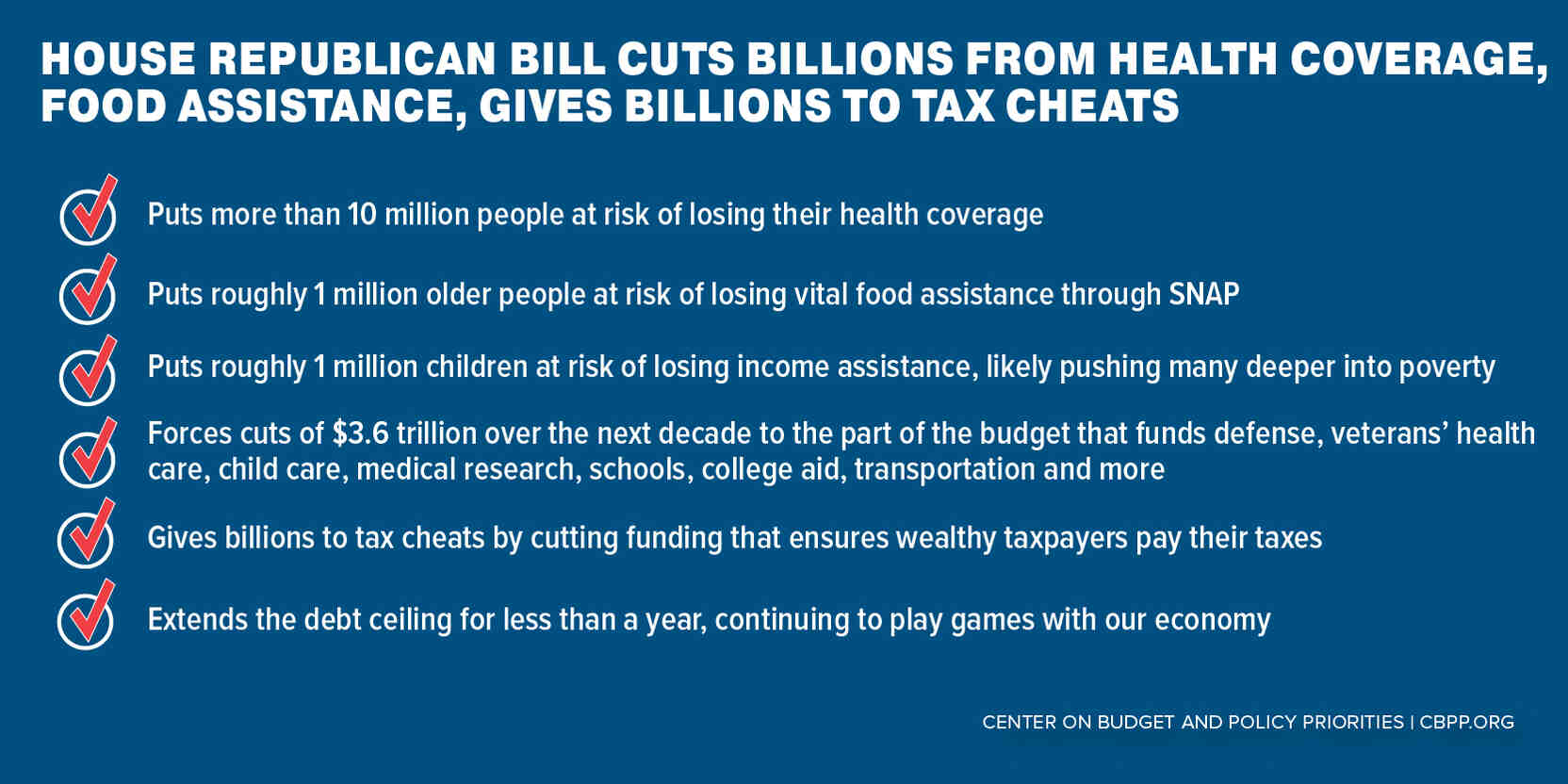
House Republican Proposals to Cut a Range of Domestic Priorities by Capping Funding for Appropriated Programs
- Vital Government Services Would Take a $3.6 Trillion Hit in McCarthy Bill. The bill containing House Republicans’ demands for raising the debt ceiling would impose severe cuts amounting to $3.6 trillion over the next ten years…. The funding cuts would hit a wide swath of vital programs.
- How House Republicans’ Harsh Funding Caps Would Affect Different, Vital Programs. In this interactive, we show that if any “discretionary” programs are protected from cuts, the unprotected programs would be hit much harder.
- House Republicans’ Agriculture Appropriations Bill Would Cut WIC Benefits for 5 Million Participants, Put SNAP Benefits at Risk for 1 Million Older Adults. The bill would make harmful policy changes and deep funding cuts to two critical food assistance programs — the Special Supplemental Nutrition Program for Women, Infants, and Children (WIC) and the Supplemental Nutrition Assistance Program (SNAP) — that would result in benefit cuts or loss of eligibility for millions of people.
- House Republican Bill Would Force Deep Cuts in Housing Assistance, Harming Families, Older Adults, and People with Disabilities. The bill would, among other things, impose severe cuts on discretionary funding amounting to $3.6 trillion over the next ten years. If defense and veterans’ health care are protected from cuts, as House Republicans have pledged, these cuts would result in an estimated 2 million people being left without the rental assistance they need to obtain or maintain stable housing, based on estimates by the Biden Administration that assume remaining programs are cut across the board.
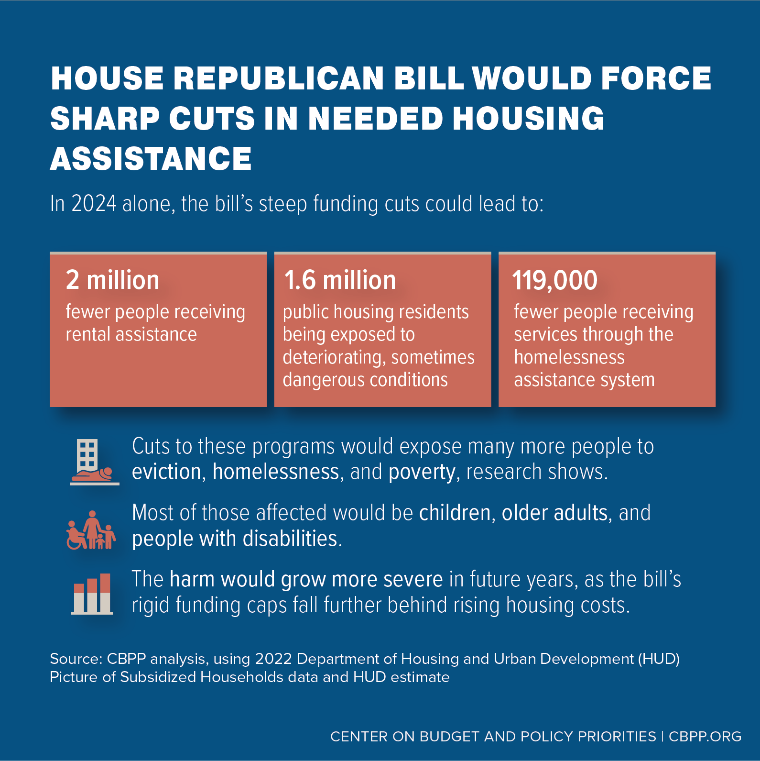
- Republican Debt-Ceiling-and-Cuts Bill Would Cost States and Local Communities $1.3 Trillion. The bill would decimate funding that states, localities, tribal nations, and U.S. Territories rely on to provide vital services like schools, transit, and aid to families in crisis.
On Twitter: David Reich tweeted about the cuts to annual appropriations in the bill and explained the depth and harm of cuts. Reich also debunked Republican claims that it’s fine to return to 2022 spending levels. He also unpacked what we learned about what spending cuts would look like after seeing four appropriations bills in areas Republicans don’t want to cut deeply.
Zoë Neuberger pointed out that the bill includes billions in cuts that would harm families with low incomes, including WIC participants. Neuberger also tweeted about how House Republicans plan to cut WIC to meet their austere spending caps.
Michael Leachman explained the bill would make deep cuts to discretionary federal aid to states, local governments, tribal nations, and U.S. Territories, and his analysis included a state-by-state table.
House Republican Proposals to Take Health Coverage from People Who Don’t Meet a Work-Reporting Requirement
- McCarthy Medicaid Proposal Puts Millions of People in Expansion States at Risk of Losing Health Coverage. A Republican proposal led by Speaker Kevin McCarthy would take Medicaid coverage away from people who do not meet new work-reporting requirements. More than 10 million people in Medicaid expansion states would be at significant risk of losing coverage under the McCarthy proposal.
- Taking Medicaid Away for Not Meeting a Work-Reporting Requirement Would Keep People From Health Care. Adding such requirements to Medicaid would cause many low-income adults to lose coverage due to bureaucratic hurdles that don’t reflect the complexity of people’s circumstances, as failed experiments in several states show. These requirements would leave people without the health care they need, including life-saving medications, treatment to manage chronic conditions, and care for acute illnesses…
On Twitter: Gideon Lukens tweeted state-by-state numbers of Medicaid expansion enrollees whose coverage would be at risk under the McCarthy proposal. Lukens also tweeted the Department of Health and Human Services’ estimates of Medicaid enrollees at risk of losing coverage under the bill.
Sarah Lueck tweeted about the Congressional Budget Office’s estimate of Medicaid coverage loss.
Laura Harker tweeted about how the bill would resurrect this failed policy.
House Republican Proposals to Take Food Assistance from People Who Don’t Meet a Work-Reporting Requirement
- Speaker McCarthy’s SNAP Proposal Would Take Food Away From Older Adults for Not Meeting Work Requirements. Speaker McCarthy’s bill would expand SNAP’s already harsh policy that takes food assistance away from many people who don’t meet a work-reporting requirement, putting SNAP at risk for about 1 million people aged 50 through 55.
- On Twitter: Ty Jones Cox tweeted about how the bill would worsen SNAP’s work requirements. Cox also tweeted about the impact of work-reporting requirements on older adults and about a proposal that would limit states’ flexibility to waive work-reporting requirements. She also tweeted about two proposals in the bill to take food assistance away from as many people as possible.
- We relaunched a series of videos highlighting low-paid workers Tim Keefe, Liz Duncan, Brian Strouse, and Mike Scott, who have been or are currently affected by the three-month time limit in Maine.
House Republican Proposals to Take TANF Income Support from People Who Don’t Meet a Work-Reporting Requirement
- TANF Provisions in McCarthy Bill Give States Incentives to Take Cash Benefits Away From Families With the Most Significant Needs. The bill would so severely limit states’ flexibility in how they provide assistance and employment services to families with children that some states could decide to stop providing cash aid to large numbers of families, with devastating results…
- TANF Provisions in House Republicans’ Debt-and-Ceiling-and-Cuts Bill Would Harm Families and Deepen Poverty Among Children. Under the bill, 540,000 work-eligible families (families subject to work requirements) with nearly 1 million children would be at risk of losing their cash benefits and being unable to afford basic necessities.
- TANF Provisions in House Republican Bill Could Increase Families’ Risk of Child Welfare Involvement. The loss of cash assistance — such as the aid TANF provides to these families — can lead to many undesirable outcomes, including higher rates of poverty, and numerous studies have linked it with increased risk of families’ involvement in the child welfare system…
- Program Administrators Across the Political Spectrum Find TANF Work Requirements Incompatible With Recipients’ Needs. The American Public Human Services Association, working with TANF administrators and human services leaders across the country — and from states with both Republican and Democratic governors — called for policymakers to reimagine how TANF could better support the families it serves…
On Twitter: Diana Azevedo-McCaffrey tweeted about how the bill would have devastating and far-reaching impacts, resulting in deeper poverty for children and families. Azevedo-McCaffrey also tweeted about the types of families who would be affected by the bill’s provisions and about the health impacts of taking TANF away from families. She also tweeted about the impact of new TANF data.
Peggy Bailey tweeted about a new Columbia University analysis on how families would be affected by losing TANF cash assistance if they don’t meet a work-reporting requirement. Bailey also tweeted about why TANF is not a “lost cause,” and the vital importance of TANF benefits to children and their families.
Aditi Shrivastava tweeted about how the bill would further restrict TANF’s reach. Shrivastava also tweeted about Georgia and what happens when states double down on work requirements and about the cost of changes to SNAP.
House Republican Proposals to Protect Tax Cheats
- On Twitter: Samantha Jacoby explained that the bill’s proposal to rescind the Inflation Reduction Act’s IRS funding would add to the deficit because it would let wealthy tax cheats off the hook. Jacoby also noted that while giving billions to high-income tax cheats, the bill would take health care, food, and cash assistance away from people who need it.
